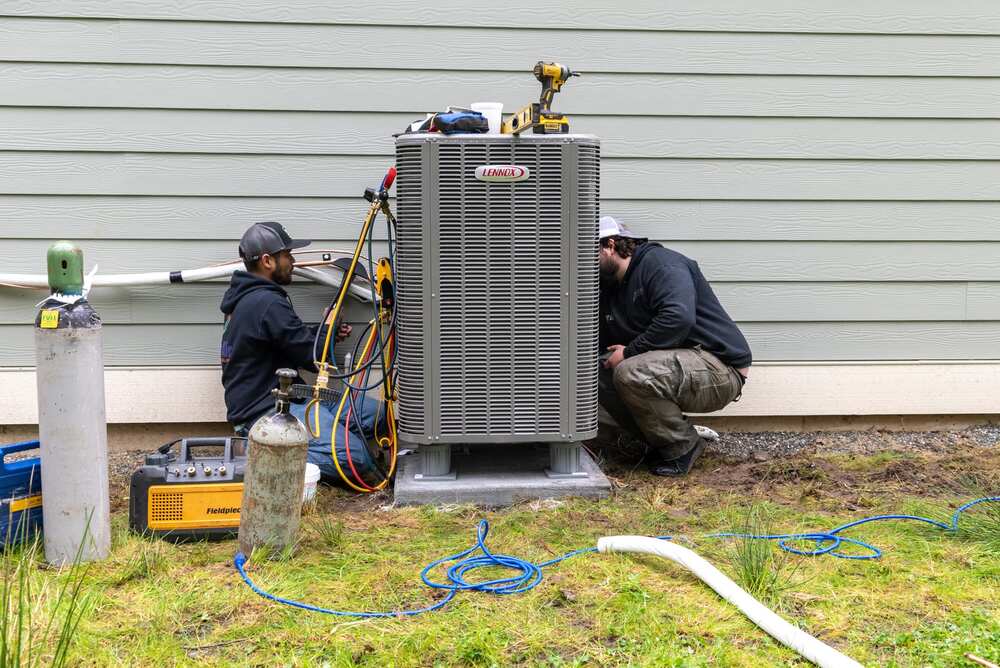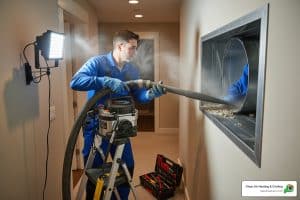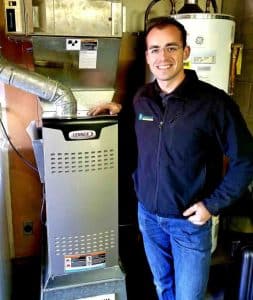Why Regular HVAC System Checkups Are Essential
HVAC system checkup plays a crucial role in maintaining your home’s comfort and efficiency. If you’re wondering whether these checkups are necessary, here’s a quick answer:
- Yes, regular HVAC system checkup helps improve efficiency, lower energy bills, and extend the lifespan of your system.
- It prevents costly repairs by catching issues early.
- Checkups ensure your system performs safely and effectively year-round.
HVAC (Heating, Ventilation, and Air Conditioning) systems are essential for maintaining a comfortable indoor environment. They regulate temperature, improve air quality, and manage humidity. Without routine checkups, these systems can become inefficient and costly to operate. A well-maintained HVAC system ensures year-round comfort, reduces energy consumption, and prevents unexpected repairs.
Clean Air Heating & Cooling specializes in providing reliable HVAC services to homeowners in Whatcom, Skagit, and Snohomish counties. Our goal is to keep your HVAC system running smoothly and efficiently.
I’m Colin Matei, owner of Clean Air Heating & Cooling. With years of experience in HVAC system checkup and maintenance, I aim to deliver peace of mind and exceptional service to our community. Let’s dive deeper into why regular checkups are essential for your HVAC system.

What Does an HVAC System Checkup Consist Of?
An HVAC system checkup is more than just a quick glance at your heating and cooling unit. It’s a comprehensive service that ensures your system is running efficiently and safely. Here’s what you can expect during a professional HVAC checkup:
Inspection
A thorough inspection is the cornerstone of any HVAC checkup. Technicians will examine:
- Furnace and Air Conditioner: Checking for wear and tear, ensuring they start, operate, and shut off properly.
- Air Ducts: Inspecting for leaks, blockages, or any signs of damage that could impede airflow.
- Safety Mechanisms: Verifying that all safety controls and mechanisms are functioning correctly.
- System Age: Assessing the age and condition of your system to recommend any necessary updates or replacements.
Technicians also inspect the thermostat settings to ensure your system keeps you comfortable and saves energy. They check electrical connections for any loose or faulty wiring, which can be a fire hazard and reduce the lifespan of your HVAC components.
Cleaning
Cleaning is essential for maintaining efficient operation. During the checkup, the technician will:
- Evaporator and Condenser Coils: Dirty coils can reduce the system’s ability to cool your home and cause it to run longer, increasing energy costs.
- Blower Components: Proper airflow is crucial for comfort and efficiency. Cleaning the blower ensures optimal performance.
- Air Filters: Dirty filters can increase energy costs and damage your equipment. It’s recommended to inspect, clean, or change them monthly.
Repairs
Identifying and fixing small issues before they become major problems can save you time and money. Common repairs include:
- Leaks: Checking for refrigerant leaks and fixing them to maintain efficiency.
- Electrical Issues: Tightening connections and ensuring safe operation.
- Refrigerant Levels: Adjusting refrigerant levels to ensure efficient cooling.
- Gas Connections: Inspecting gas pressure, burner combustion, and the heat exchanger for any signs of trouble.
Technicians also lubricate all moving parts to reduce friction and wear, which helps your system run smoothly and efficiently. The condensate drain is checked and cleaned to prevent water damage and maintain proper humidity levels.
System Controls
Finally, the technician will check the controls of the system. This includes verifying the starting cycle, operation, and shutdown to ensure everything works as it should.
In summary, a comprehensive HVAC system checkup involves detailed inspection, thorough cleaning, and necessary repairs to keep your system running efficiently and safely. Regular checkups not only extend the lifespan of your HVAC system but also help you save on energy bills and prevent costly repairs.
Next, let’s explore the benefits of regular HVAC system checkups and why they are a smart investment for every homeowner.
Benefits of Regular HVAC System Checkups
Regular HVAC system checkups offer several key benefits that make them a smart investment for any homeowner. These include improved efficiency, cost savings, and an extended lifespan for your system.
Improved Efficiency
A well-maintained HVAC system operates more efficiently. When components like evaporator and condenser coils are clean, the system doesn’t have to work as hard to cool or heat your home. This means less energy consumption and lower utility bills.
Proper airflow is crucial for efficiency. If the blower components are clean and the air filters are regularly changed, the system can circulate air more effectively. This reduces the strain on the system and helps maintain a comfortable indoor environment.
Cost Savings
Preventative maintenance can save you a lot of money in the long run. By identifying and fixing minor issues early, you can avoid costly repairs or even a complete system replacement. For instance, a simple refrigerant level adjustment can prevent your air conditioner from overworking and wearing out prematurely.
Lower energy bills are another significant benefit. A clean and well-lubricated system runs more efficiently, consuming less electricity. According to Forbes, regular checkups ensure energy efficiency, which translates to lower monthly bills.
Extended Lifespan
Regular maintenance plays a crucial role in extending the life of your HVAC system. Most systems have a lifespan of 10-15 years, but with proper care, they can last even longer. Regular checkups reduce wear and tear, ensuring that your system performs optimally for years to come.
Timely repairs and optimal performance mean fewer breakdowns and a longer-lasting system. This is especially important for maintaining warranty compliance. Many manufacturers require regular maintenance to keep the warranty valid, protecting you from unexpected expenses.
In summary, regular HVAC system checkups lead to improved efficiency, cost savings, and an extended lifespan. These benefits make regular maintenance a smart investment for every homeowner.
Next, let’s explore the common HVAC problems identified during checkups and how they can be addressed.
Common HVAC Problems Identified During Checkups
Regular HVAC system checkups are essential to identify and address common issues before they escalate into costly repairs. Here are some of the most frequent problems finded during these inspections:
Airflow Issues
Blocked airflow is a common problem that can severely impact your HVAC system’s performance. Blocked vents, dirty filters, and duct leaks are typical culprits.
- Blocked Vents: Furniture or debris can block vents, restricting airflow. This forces the system to work harder, reducing efficiency.
- Dirty Filters: Filters should be inspected, cleaned, or changed monthly. A dirty filter can obstruct airflow, increasing energy consumption and damaging the system.
- Duct Leaks: Leaky ducts can lose up to 30% of airflow, leading to inefficient cooling or heating. Sealing these leaks can significantly improve system performance.
Temperature Problems
Issues with maintaining the desired temperature are often due to problems with the thermostat settings, refrigerant levels, or airflow.
- Thermostat Settings: Incorrect settings can cause your system to overheat or underperform. Ensuring the thermostat is properly calibrated can solve many temperature issues.
- Refrigerant Levels: Low refrigerant levels can impede the cooling process, while too much refrigerant can also cause problems. Regular checks and adjustments are crucial.
- Airflow: Poor airflow can lead to uneven temperatures throughout your home. Addressing blocked vents and dirty filters can help maintain consistent temperatures.
Electrical and Mechanical Issues
Electrical and mechanical problems can pose significant risks and reduce the efficiency of your HVAC system. Common issues include loose connections, motor problems, and ignition issues.
- Loose Connections: Faulty electrical connections can cause unsafe operation and reduce the lifespan of major components. Tightening these connections during checkups is essential.
- Motor Problems: A malfunctioning blower motor can lead to poor airflow and increased energy consumption. Regular lubrication and inspection can prevent motor issues.
- Ignition Issues: Ignition problems can prevent your furnace from starting or cause it to shut down unexpectedly. These issues often stem from a faulty igniter or flame sensor.
Other common issues include:
- Leaks: Water or refrigerant leaks can cause significant damage and reduce system efficiency. Addressing these leaks promptly is crucial.
- Strange Noises: Unusual sounds often indicate mechanical issues like loose parts or motor problems. Identifying the source of these noises can prevent further damage.
- Dirty Coils: Evaporator and condenser coils can accumulate dirt, reducing their efficiency. Regular cleaning is necessary to maintain optimal performance.
- Ductwork Issues: Damaged or poorly designed ductwork can lead to airflow problems and reduced efficiency. Inspecting and repairing ductwork during checkups can resolve these issues.
Regular HVAC system checkups can identify these common problems early, ensuring your system operates efficiently and reliably. Addressing these issues promptly can save you money and extend the lifespan of your HVAC system.
Next, we’ll explore the differences between DIY HVAC inspections and professional checkups.
DIY HVAC Inspection vs. Professional Checkup
DIY Inspection
Performing a DIY HVAC inspection can be a great way to catch minor issues before they become bigger problems. Here are some basic steps you can take:
- Visual Checks: Inspect your HVAC unit for any obvious signs of wear and tear. Look for loose parts, rust, or any unusual debris around the unit.
- Leaks: Check for water or refrigerant leaks. Water leaks can often be found around the indoor unit, while refrigerant leaks may leave an oily residue.
- Electrical Connections: Ensure that all electrical connections are tight and secure. Loose wires can lead to system malfunctions or even pose a fire hazard.
- Unusual Noises: Listen for any strange sounds coming from your HVAC system. Squealing, grinding, or banging noises can indicate mechanical issues.
- Dirty Filters: Replace the air filters every three months, or more frequently if needed. Dirty filters can block airflow and reduce system efficiency.
While these steps are helpful for basic maintenance, they can’t replace the expertise of a professional.
Professional Checkup
A professional HVAC checkup goes beyond what you can do on your own. Here’s why it’s worth considering:
- Detailed Inspection: Professionals conduct a thorough examination of your entire HVAC system, including components that are not easily accessible.
- Specialized Tools: Technicians use specialized tools to measure refrigerant levels, check for gas leaks, and test electrical components.
- Safety Checks: Safety is a top priority. Professionals ensure that all safety mechanisms are functioning correctly, reducing the risk of hazards.
- Comprehensive Report: After the inspection, you’ll receive a detailed report outlining any issues found and recommended repairs or maintenance tasks.
Professional expertise is crucial for tasks like checking refrigerant levels and cleaning evaporator and condenser coils. These require specific tools and knowledge to handle safely and effectively.

When to Opt for Professional Help
While DIY inspections are great for routine checks, certain situations call for professional expertise:
- Complex Issues: If you notice persistent problems like uneven temperatures or strange noises, it’s time to call a professional.
- Annual Maintenance: Regular professional checkups can prevent major issues and extend the lifespan of your system.
- Safety Concerns: Handling electrical components or refrigerants can be dangerous. Leave these tasks to trained technicians.
In summary, combining DIY inspections with professional checkups ensures that your HVAC system remains in top condition. Regular maintenance can save you money, improve efficiency, and keep your home comfortable year-round.
Next, we’ll answer some frequently asked questions about HVAC system checkups.
Frequently Asked Questions about HVAC System Checkups
What does an HVAC checkup consist of?
An HVAC system checkup involves several key tasks to ensure your system is running smoothly and efficiently. Here’s a breakdown:
- Inspection: Technicians will inspect your furnace, air conditioner, and air ducts. They check for any signs of wear and tear, leaks, and ensure all safety mechanisms are functioning correctly. They also assess the system’s age and overall condition.
- Cleaning: Cleaning is crucial for maintaining efficiency. This includes cleaning evaporator and condenser coils, blower components, and replacing or cleaning air filters. Dirty components can reduce efficiency by up to 15% and increase energy costs.
- Repairs: During the checkup, any minor repairs needed are addressed. This can include fixing leaks, electrical issues, adjusting refrigerant levels, checking gas connections, and ensuring proper burner combustion and heat exchanger function.
Does your HVAC system really need regular checkups?
Yes, regular HVAC system checkups are essential. Here’s why:
- Smooth Operation: Regular maintenance ensures your system operates smoothly, providing consistent comfort in your home.
- Major Problems Prevention: Routine checkups can catch minor issues before they become major, costly repairs. For instance, a simple refrigerant level check can prevent compressor failure, which is much more expensive to fix.
- Efficiency and Cost Savings: Regular maintenance keeps your system running efficiently, reducing energy consumption and lowering utility bills. According to Clean Air Heating & Cooling, well-maintained systems can operate up to 25% more efficiently.
How do you check your HVAC system?
You can perform some basic checks yourself, but a professional checkup is highly recommended for comprehensive maintenance. Here’s a quick guide:
DIY Inspection Steps
- Visual Checks: Look for obvious signs of wear, rust, or debris around the unit.
- Leaks: Check for water or refrigerant leaks.
- Electrical Connections: Ensure all wires are tight and secure.
- Unusual Noises: Listen for strange sounds, like squealing or banging.
- Dirty Filters: Replace air filters every three months to maintain airflow and efficiency.
Professional Checkup Benefits
- Detailed Inspection: Professionals inspect areas you can’t easily access, like internal components and ductwork.
- Specialized Tools: Technicians use tools to measure refrigerant levels, check for gas leaks, and test electrical components.
- Safety Checks: Professionals ensure all safety mechanisms are functioning correctly, reducing the risk of hazards.
- Comprehensive Report: After the inspection, you’ll receive a detailed report outlining any issues and recommended repairs or maintenance tasks.

Combining DIY inspections with professional checkups is the best approach to keep your HVAC system in top condition. Regular maintenance can save you money, improve efficiency, and provide peace of mind.
Next, we’ll explore common HVAC problems identified during checkups.
Conclusion
Regular HVAC system checkups are not just a routine task—they are essential for maintaining a comfortable, efficient, and safe home environment. Here’s why:
Importance of Regular Checkups
Regular checkups ensure your HVAC system runs smoothly. They help catch minor issues before they become major problems, saving you from costly repairs and unexpected breakdowns. This proactive approach can prevent issues like refrigerant leaks, dirty coils, and faulty electrical connections, which can compromise your system’s efficiency and lifespan.
Benefits
- Improved Efficiency: Clean and well-maintained components ensure proper airflow and reduce energy consumption. This means lower utility bills and a more comfortable home.
- Cost Savings: Preventative maintenance helps avoid expensive repairs. According to Forbes, regular maintenance can save you significant money by keeping your system running efficiently.
- Extended Lifespan: Timely repairs and maintenance reduce wear and tear, ensuring your HVAC system lasts longer.
Clean Air Heating & Cooling
At Clean Air Heating & Cooling, we pride ourselves on providing top-notch HVAC services in Bellingham, WA, and surrounding counties. Our commitment to customer satisfaction is reflected in our 25% utility savings guarantee and over 480 5-star Google reviews. We ensure prompt, high-quality service to keep your HVAC system in peak condition.
Customer Satisfaction
Our customers appreciate our thorough and professional approach. We believe in clear communication, expert service, and ensuring you’re comfortable in your home. Whether it’s a routine checkup or an emergency repair, we’re here to help.
Utility Savings Guarantee
We offer a 25% utility savings guarantee. This means that with our maintenance services, you can expect to see a significant reduction in your energy bills. This guarantee is part of our commitment to providing value and peace of mind to our customers.
For more information on how we can help maintain your HVAC system and ensure it runs efficiently, visit our Maintenance page.
Regular HVAC checkups are essential for a well-functioning home. They save money, improve efficiency, and extend the lifespan of your system. Trust Clean Air Heating & Cooling for all your HVAC needs, and enjoy the benefits of a well-maintained system.





